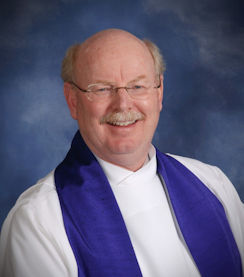Rev. John Boley considers the training styles of Tiger Woods and Roger Federer. He suggests pastors could use both examples to increase their range.

JOHN BOLEY
Clergy Assistant, Michigan Conference
So one of the books on the stack that actually got read recently is “Range: Why Generalists Triumph in a Specialized World,” by David Epstein.
I was originally drawn to this book by a morning news interview with the author in which he described the differences in the training and development of Tiger Woods and Roger Federer. Epstein claims that Tiger Woods is the quintessential “early specialist,” from the age of two being single-mindedly directed by his father to be a championship golfer. It obviously worked, and Woods was playing amazing golf at an early age.
Federer, on the other hand, participated in multiple sports before settling on tennis. Indeed, his mother, a tennis coach, quit coaching him because he was always distracted by other athletic pursuits and could not focus on exactly what it was she wanted to drill into him. And he would still be tinkering with his shots in a way that frustrated his own mother. Of course, he went on to become the greatest male tennis player of all time. Federer is an example of a “late specialist.”
So Epstein examines the dynamics of specialization and generalization in our culture and offers an interesting perspective: as the subtitle of the book indicates – while culture seems to value and emphasize early specialization in all fields, it is a certain degree of early generalization leading to late specialization which is more successful in our world. Generalists have a broader “Range” and are not as limited as early specialists. As one who actively believes in and pursued a liberal arts education, and who resisted too much specialization while practicing law, Epstein’s thesis was music to my ears.
Epstein goes on to cite a vast amount of material from chess, science, music, technology, and literature where generalization followed by late specialization was a more successful route. It is fascinating reading and an excellent study of our society today and human achievement within it. In a nutshell, generalization allows individuals greater Range to think outside the box and not be stifled by ingrained rules learned so early that is then impossible to break out of.
So what? That’s all well and good, but what does that have to do with us in the Church of Jesus Christ?
I have come to believe that the same dynamics of Range are at play in pastoral leadership and that a certain amount of generalization is most healthy in performing pastoral roles and leading a congregation. I haven’t done this all correctly myself, of course, but it is good to pin it down conceptually. Although for me personally, I can point to my experiences in the U.S. Navy and in practicing law which have been every bit as important in my pastoral leadership as have been skills in biblical interpretation and theological understanding.
Not every pastor is going to have the same kinds of experiences. Not every pastor will be a second or third career pastor who automatically brings to the pastorate experience in other realms. Nevertheless, even while in the pastorate, there are many ways to broaden horizons and bring some Range to the roles of the pastor.
This is especially true in preaching. If a preacher can only preach about salvation, he/she will quickly become boring. If a preacher who wants to be a prophet can only talk about radical social justice, he/she will soon become irrelevant. Preaching has to be broader and deeper, beckoning parishioners to join into a mysterious journey that relates to them.
So, to pastors, and SPRCs, my advice would be to expand your “Range” – find ways to cross-train and generalize such that your late specialization in preaching, teaching, and pastoral care can be authentic, grounded and relatable.
Here are some possibilities:
1. Broaden your reading repertoire. Reading only about church growth and vitality, or biblical commentaries, will not bring the breadth of perspective necessary to relate to a congregation in preaching, teaching, administration or pastoral care.
2. Participate in the community to cross-train for the place of the congregation in that community.
3. Spend time with people who are not cradled Christians to get a higher breadth of relatable human experience.
4. Travel when you can – there is nothing like travel to obtain Range and expand preaching and teaching possibilities.
5. Be willing to experiment, like later specialists Roger Federer and Thomas Edison, with the acceptance of failure as a learning experience.
6. Remember that God’s wonderful world is full of grace, diversity, and surprises, beyond our self-absorption, and to be effective pastors, we should seek Range – busting out of our self-imposed early specialization rules.
Last Updated on September 20, 2022

